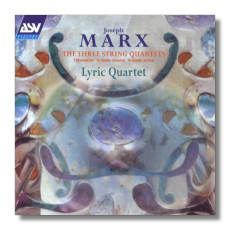
The Internet's Premier Classical Music Source
Related Links
- Latest Reviews
- More Reviews
-
By Composer
-
Collections
DVD & Blu-ray
Books
Concert Reviews
Articles/Interviews
Software
Audio
Search Amazon
Recommended Links
Site News
 CD Review
CD Review
Joseph Marx

String Quartets
- Quartet #1 in A Major "Quartetto Chromatico" (1948)
- Quartet #2 "Quartetto in Modo Antico" (1938)
- Quartet #3 "Quartetto in Modo Classico" (1941)
Lyric Quartet
Academy Sound & Vision CDDCA1073 DDD 79:22
It is a truism that after World War I those composers whose hearts still unapologetically belonged to tonality ended up working their Romantic magic in Hollywood.
This is certainly true, post-1933, of many Jewish composers; but a number of non-Jewish composers remained in Europe and only now is their music beginning to gain much (if anything) in the way of recognition.
Joseph Marx was one of these. Born in Graz, Austria, in 1882, he taught at the Imperial Music Academy in Vienna from 1914, becoming its director from 1922-7. From 1931 until his death in 1964 he was one of Vienna's most influential critics and writers.
He was also, as this delightful disc makes plain, a composer of no small talent.
Of the three quartets here, all of them in deliberately "antiquated" styles for their dates (late 1930s and early '40s), the Quartetto in modo classico, his third composed 1940/41, is my personal favourite.
Here Marx pays homage to the spirit and style of the Viennese Classical quartet, particularly Haydn and Mozart, although the music hardly sounds like those of his models - even if the main theme of the opening movement (which returns, delightfully, in cyclical fashion at the close of the work) does resemble the second theme of the first movement of Beethoven's Symphony #2, in a distant-cousin fashion.
The quartet is elegant, stylish, witty and charming. I can imagine few people resisting its charms. Certainly I cannot.
The Quartetto Chromatico composed in 1936/7 and revised in 1948, was Marx's first essay in the form. It is the most "modern" in style and its most obvious debt is to Max Reger (whose own quartets deserve wider currency), although there are passages which to my ears have the stamp of Delius. (a somewhat bizarre juxtaposition, you might think, but Delius was, after all, a member of the "Frankfurt Gang" and always considered himself more a German composer than English)
There is only one word which springs to mind for this quartet: gorgeous.
Finally, the Quartetto in Modo Antico which, I confess, is my least favourite of the three - but that's only by comparison. It is a finely-crafted tribute to earlier composers like Lassus and Palestrina, although, once again, it never sounds merely imitative.
The Lyric Quartet play these three works with complete assurance and an evident belief that their half-century of neglect has been ill-deserved; an opinion I heartily second.
This has been one of my discoveries of the year so far; it has probably spent more time on my CD players (at home and office) than any other.
Nobody who has any interest in the development of the string quartet after Brahms should ignore this marvellous (and well-recorded) disc.
Copyright © 2000, Deryk Barker


















